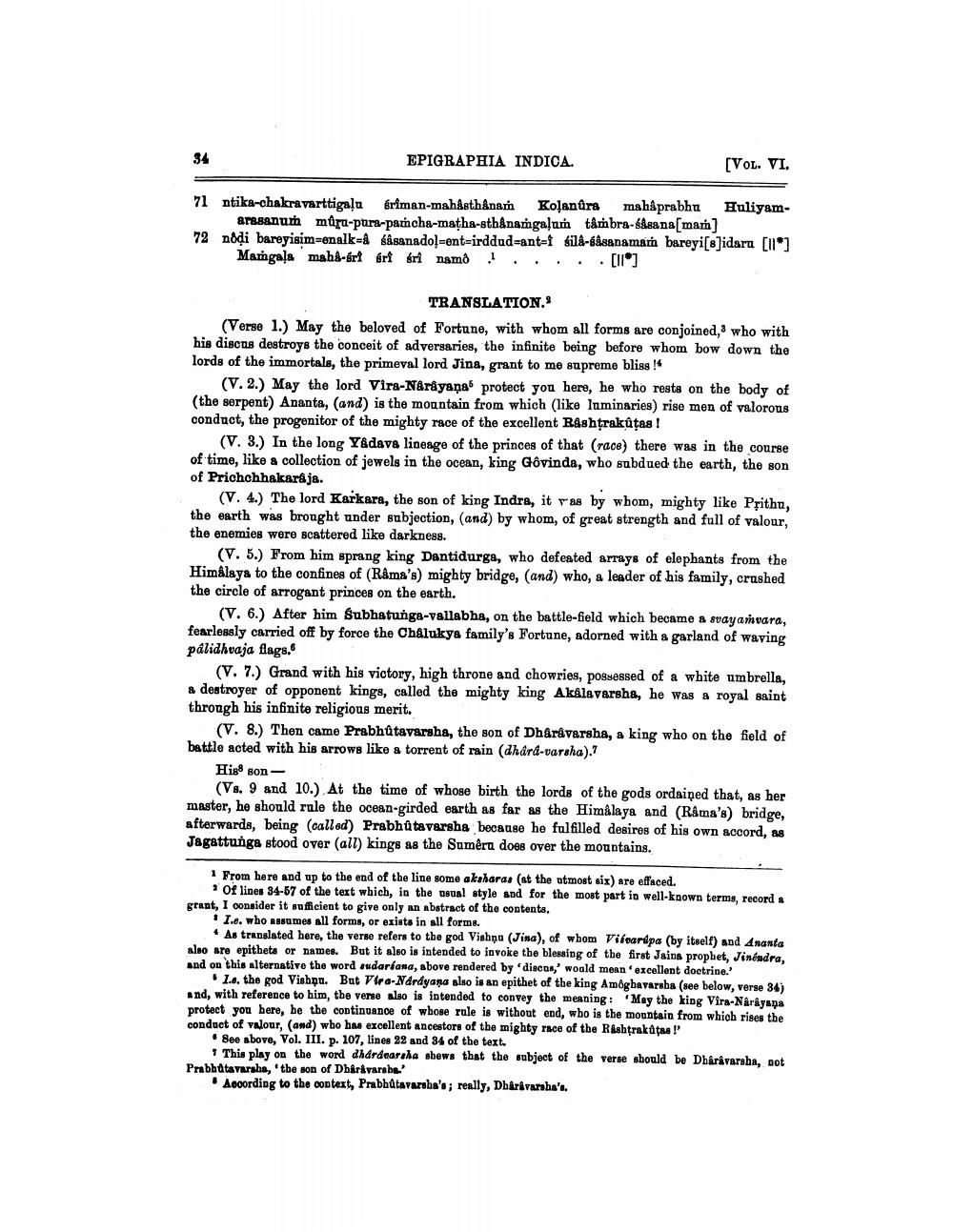________________
34
EPIGRAPHIA INDICA.
[Vol. VI.
71 ntika-chakravarttigaļu sriman-mahåsthånam Koļanûra maháprabhu Huliyam
arasanun müra-pura-pancha-matha-sth&namgalum tâmbra-sAsana mam] 72 nodi bareyisim=enalk=& śâsanadol-ent-irddud=ant-1 sild-fasanaman bareyi[6]idara [ll*]
Mangaļa mahd-ért erf ári namo . . . . [ll]
TRANSLATION. (Verse 1.) May the beloved of Fortune, with whom all forms are conjoined," who with his discus destroys the conceit of adversaries, the infinite being before whom bow down the lords of the immortals, the primeval lord Jina, grant to me supreme bliss !
(V. 2.) May the lord Vira-Narayana protect you here, he who rests on the body of (the serpent) Ananta, (and) is the mountain from which (like luminaries) rise men of valorous conduct, the progenitor of the mighty race of the excellent Rashtrakūtas !
(V. 3.) In the long Yadava lineage of the princes of that (race) there was in the course of time, like a collection of jewels in the ocean, king Govinda, who subdued the earth, the son of Prichchhakarája.
(V. 4.) The lord Karkara, the son of king Indra, it as by whom, mighty like Pritha, the earth was brought under subjection, (and) by whom, of great strength and full of valour, the enemies were scattered like darkness.
(V. 5.) From him sprang king Dantidurga, who defeated arrays of elephants from the Himalaya to the confines of (Rama's) mighty bridge, (and) who, a leader of his family, crashed the circle of arrogant princes on the earth.
(V. 6.) After him Subhatunga-vallabha, on the battle-field which became a svayamvara, fearlessly carried off by force the Chalukya family's Fortune, adorned with a garland of waving pálidhuaja flags.
(V. 7.) Grand with his victory, high throne and chowries, possessed of a white umbrella, a destroyer of opponent kings, called the mighty king Akalavarsha, he was a royal saint through his infinite religious merit.
(V. 8.) Then came Prabhutavarsha, the son of Dharivarsha, a king who on the field of battle acted with his arrows like a torrent of rain (dhard-varsha).7
His son
(Vs. 9 and 10.). At the time of whose birth the lords of the gods ordained that, as her master, he should rule the ocean-girded earth as far as the Himalaya and (Råma's) bridge. afterwards, being called) Prabhu tavarsha because he fulfilled desires of his own accord, as Jagattunga stood over (all) kings as the Sumêru does over the mountains.
1 From here and up to the end of the line some aksharas (at the utmost six) are effaced.
of line 34-67 of the text which, in the usual style and for the most part in well-known terms, record a grant, I consider it suficient to give only an abstract of the contents.
1.e. who assumes all forms, or exists in all forms.
• As translated here, the verse refers to the god Vishnu (Jina), of whom Vibeardpa (by itself) and Ananta also are epitheta or names. But it also is intended to invoke the blessing of the first Jains propbet, Jinéadra, and on this alternative the word rudariana, above rendered by discon,' would mean excellent doctrine.
1.o, the god Vishnu. But Vira-Nerdyana also is an epithet of the king Amoghavarsha (see below, Verse 34) and, with reference to him, the verse also is intended to convey the meaning: 'May the king Vira-Narayana protect you here, be the continuance of whose rule is without end, who is the mountain from which rises the conduct of valour, (and) who has excellent ancestors of the mighty race of the Rashtrakatas !
• See above, Vol. III. p. 107, lines 22 and 34 of the text.
This play on the word dhdrdoaraha shows that the subject of the verse should be Dharkvarsha, Bot Prabhutavaraha, 'the son of Dharkvarsbr.
• According to the context, Prabhatavarsha's; really, Dharivarsha's.




